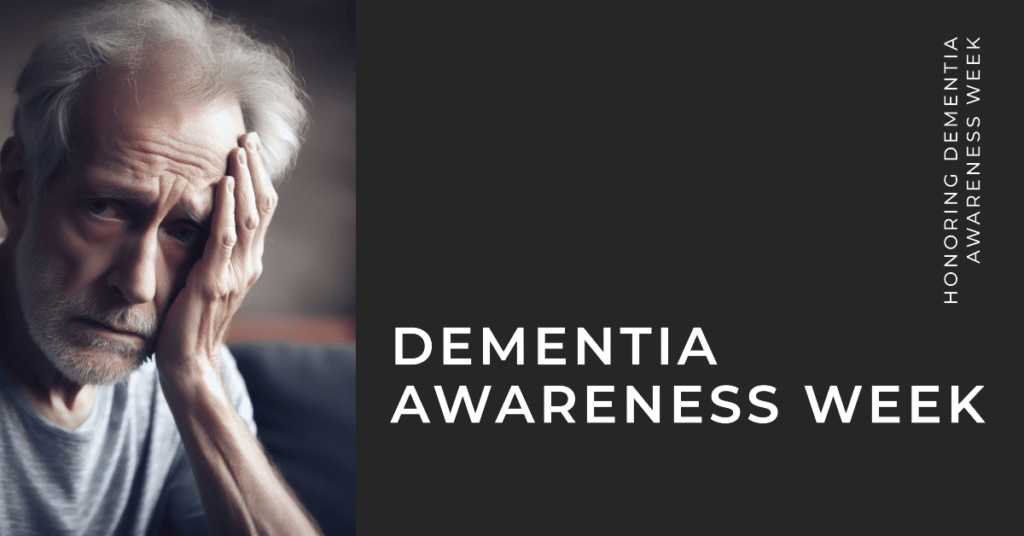Why dementia awareness training is important in health and social care

With approximately 850,000 individuals grappling with dementia in the UK, the importance of dementia awareness training for care workers and professionals in health and social care cannot be overstated, as well as friends and families cannot be overstated.
As life expectancies rise, equipping oneself with the necessary skills to support those living with dementia becomes increasingly vital.
By 2025, the population of individuals living with dementia is projected to swell to a staggering one million, and this number is forecasted to surge to two million by 2050. This trend underscores the urgent need for comprehensive dementia awareness training to meet the challenges ahead.
In this article, we’ll talk about why it’s important to learn about dementia. We’ll explain how dementia awareness helps caregivers, friends, and family take better care of people. We’ll also talk about how more and more people are experiencing dementia, and how it affects them and their families.
Table of contents
- Understanding dementia
- Signs and Symptoms of Dementia
- Why Dementia Awareness Matters?
- Dementia Courses
- Benefits of Pursuing Dementia Awareness Training Courses
- Dementia training helps professionals learn how they should respond to patients
- Dementia training can help professionals provide support to relatives and loved ones
- Key Topics Covered in Dementia Awareness Training
- Who Can Benefit from Dementia Training?
- Exploring Online Dementia Courses
- Spreading Dementia Awareness: Together We Make a Difference
- Dementia Awareness Week and Month
- What is the outlook for dementia care training?
- LATEST POSTS
Understanding dementia
To make sense of dementia, it’s important to know that it affects how people remember, think, and act. Dementia isn’t just one thing; it’s a word that covers many problems with thinking. Dementia can change a person’s life and the lives of those who help them.
While Alzheimer’s is the most talked about, there are also types like vascular dementia, frontotemporal dementia, and Lewy body dementia. Knowing these different types helps us care for people better.
Explaining What Dementia Means
Dementia is a broad term used to describe a group of cognitive disorders that affect a person’s memory, thinking, reasoning, and behavior to the extent that it interferes with their daily functioning and quality of life.

It is not a specific disease itself, but rather a syndrome caused by various underlying conditions. The most common cause of dementia is Alzheimer’s disease. Although there are other types as well, each with its own distinct characteristics and causes. We explain in detail what dementia means here.
EMPOWER YOURSELF – START DEMENTIA AWARENESS ONLINE TRAINING – CLICK HERE
Types of Dementia
As previously mentioned, each type of dementia has its own unique characteristics, symptoms, and progression patterns. Knowing the different types of dementia can offer significant benefits to caregivers, friends, and family members of individuals affected by dementia. So Let’s focus on the 10 common types of dementia now:
Alzheimer’s Disease:
- Alzheimer’s disease is the most common type of dementia. It leads to memory loss, difficulty with problem-solving, and changes in behavior. Abnormal protein deposits in the brain cause damage to nerve cells, leading to cognitive decline.
Vascular Dementia:
- Vascular dementia occurs due to reduced blood flow to the brain, often resulting from strokes or other blood vessel-related issues. This type of dementia can lead to difficulties with thinking, reasoning, and memory.
Lewy Body Dementia:
- Lewy body dementia is characterized by the presence of abnormal protein deposits called Lewy bodies in the brain. This type of dementia can lead to fluctuations in cognitive abilities, visual hallucinations, and movement problems similar to Parkinson’s disease.
Frontotemporal Dementia:
- Frontotemporal dementia affects the frontal and temporal lobes of the brain, leading to changes in personality, behavior, and language. Memory may not be as affected in the early stages of dementia as social and emotional functioning.
Mixed Dementia:
- Mixed dementia occurs when a person has more than one type of dementia. For example, a person might have both Alzheimer’s disease and vascular dementia. This combination can make diagnosis and management more complex.
Parkinson’s Disease Dementia:
- Parkinson’s disease dementia is a type of dementia that develops in people with Parkinson’s disease. Over time, cognitive impairments become more pronounced in addition to the movement-related symptoms of Parkinson’s disease.
Huntington’s Disease Dementia:
- Huntington’s disease is a genetic disorder that causes progressive brain cell degeneration. As the disease progresses, cognitive decline occurs, leading to dementia symptoms along with movement abnormalities.
Creutzfeldt-Jakob Disease:
- Creutzfeldt-Jakob disease is a rare and fatal brain disorder caused by abnormal proteins. It leads to rapid cognitive decline, muscle stiffness, and twitching. This type of dementia progresses quickly.
Normal Pressure Hydrocephalus:
- Normal pressure hydrocephalus is a reversible cause of dementia. It occurs when excess cerebrospinal fluid accumulates in the brain’s ventricles, leading to symptoms such as difficulty walking, memory loss, and urinary problems.
Posterior Cortical Atrophy:
- Posterior cortical atrophy primarily affects the back part of the brain responsible for visual processing. This type of dementia leads to visual disturbances, such as problems with recognizing objects, faces, and reading.

The cost of dementia care in the UK is estimated to be £26.7 billion per year. This is expected to rise to £55 billion by 2040.
DEMENTIA AWARENESS TRAINING FOR STAFF MEMBERS – TALK TO OUR TEAM – 01782 563333
Benefits of Understanding Different Dementia Types for Caregivers and Families
Understanding different types of dementia helps caregivers, friends, and families of people with dementia. In dementia awareness training, each type of dementia is discussed.
Knowing the type of dementia makes caregiving better. This helps caregivers adjust, prepare, and care in a way that supports the person with dementia. Here’s why it’s helpful:
- Better Understanding: Knowing the specific type of dementia helps caregivers understand the challenges. This helps them support the person better.
- Better Care: Different types have different symptoms. Knowing this helps caregivers give the right care. For example, caring for someone with Alzheimer’s is different from caring for someone with Lewy body dementia.
- Better Communication: Some dementias affect talking and emotions. Knowing which type can help caregivers talk and connect better.
- Predicting Changes: Each dementia follows a certain path. Knowing this helps caregivers plan for what might happen next.
- Finding Help: Different dementias have different resources. Knowing the type helps caregivers find the right support.
- Less Stress: Sometimes, not knowing why someone acts a certain way is frustrating. Knowing the dementia type explains these actions, helping caregivers stay patient.
- Realistic Expectations: Knowing what’s likely to happen helps caregivers plan for the future and not feel overwhelmed.
- Speaking Up: Knowing the type helps caregivers talk to doctors and raise awareness about dementia.

As of 2022, an estimated 900,000 people in the UK were living with dementia.
Signs and Symptoms of Dementia
The symptoms and signs of dementia can vary based on the type of dementia and the stage of the condition. Early signs of dementia should always be paid attention to. However, there are some common symptoms that are often associated with various forms of dementia.
These symptoms typically become more pronounced and debilitating as the condition progresses. Here are some common symptoms and signs of dementia:
- Memory Loss: One of the most well-known symptoms of dementia is memory loss. This can include forgetting recent events, names, appointments, and familiar faces. Over time, the person may struggle to recognize even close family members.
- Difficulty with Communication: Individuals with dementia may have trouble finding the right words, following conversations, or expressing themselves coherently. They might repeat themselves or struggle to engage in meaningful discussions.
- Confusion and Disorientation: People with dementia often become disoriented in time and space. They might not know what day it is, where they are, or how they got there. This can lead to increased anxiety and frustration.
- Impaired Judgment: Dementia can affect a person’s ability to make sound decisions and judgments. This can manifest as poor financial choices, neglecting personal hygiene, or being unable to assess risks.
- Difficulty Performing Familiar Tasks: Activities that were once routine and familiar can become challenging for individuals with dementia. This could include tasks like cooking, using household appliances, or managing finances.
Other signs and symptoms are
- Personality and Behavior Changes: Dementia can cause shifts in personality and behavior. A person might become irritable, agitated, anxious, or even exhibit uncharacteristic aggression. They may also withdraw from social activities they once enjoyed.
- Loss of Initiative: Individuals with dementia may lose their motivation to engage in activities, whether hobbies, work, or social interactions. They might spend more time sleeping or sitting passively.
- Misplacing Items: It’s common for people with dementia to misplace things and not remember where they put them. This can lead to frustration and accusations of theft, even when there is no evidence of such.
- Changes in Visual Perception: Some forms of dementia, such as Lewy body dementia, can lead to visual hallucinations or difficulties interpreting visual information.
- Motor Symptoms: In certain types of dementia, like Parkinson’s disease dementia, motor symptoms like tremors and difficulty with movement can be prominent.
Understanding the symptoms and signs of dementia is crucial for caregivers because it helps them provide better care and support for individuals with dementia.
By tailoring care to the person’s needs and stages of dementia, caregivers can enhance the quality of life, maintain independence, and create a supportive environment. This knowledge empowers caregivers to plan for the future and foster meaningful social interactions, benefiting both individuals with dementia and their caregivers.

Projected annual cost of dementia care by 2040: £55 billion. Increase of over 50% from 2022 figure.
DEMENTIA AWARENESS ONLINE COURSE – CPD CERTIFICATE APPROVED
Why Dementia Awareness Matters?
Dementia affects millions of people worldwide. It has far-reaching effects on individuals and their families. It’s really important to help people understand what dementia is and how it affects others.
Dementia awareness matters for a variety of reasons. It transforms care, reduces stigma, empowers families, and instigates positive changes on a societal scale.
Here are important reasons why dementia awareness is important:
1. Providing Better Care and Support
One of the primary reasons why dementia awareness is crucial is that it drives the need for improved care and support systems.
As more people understand the intricacies of dementia, its symptoms, and its progression, caregivers and healthcare professionals can tailor their approach to provide the best possible assistance.
By being aware of the specific needs of individuals with dementia, we can create environments that promote comfort, safety, and dignity.
2. Reducing Stigma and Enhancing Quality of Life
Dementia awareness also has a significant role in addressing the stigma linked to the condition. Misunderstandings and misconceptions regarding dementia can result in social isolation, discrimination, and even neglect.
When accurate information is disseminated and understanding is encouraged, the barriers isolating individuals with dementia are broken down. This subsequently improves their quality of life by enabling them to remain engaged in social activities, sustain relationships, and continue participating in activities they enjoy.
The efforts towards raising awareness help society realize that dementia is not a normal aspect of aging but a complex medical condition that necessitates empathy, compassion, and appropriate care. Treating individuals with dementia with respect and dignity significantly enhances their overall well-being.
3. Empowering Families and Caregivers
Dementia doesn’t solely affect the individuals diagnosed with the condition; it also has an impact on their families and caregivers.
Raising awareness provides these caregivers with the necessary knowledge and tools to deliver effective care, all while tending to their own well-being.
From handling behavioral changes to grasping communication strategies, caregivers are better equipped to navigate the challenges that arise in the course of their caregiving journey.
4. Making Changes for the Future
Dementia awareness doesn’t solely impact the present; it also shapes the future. As awareness spreads, it stimulates interest in research aimed at better understanding the causes, prevention, and treatment of dementia. Furthermore, heightened awareness can result in policy changes that prioritize dementia care and research funding. By amplifying the collective voice, advocacy for a world where individuals with dementia receive the support and attention they merit is advanced.
Collaborative efforts to increase awareness about dementia contribute to a more inclusive and compassionate world for all those affected by this condition.
Start Learning
Dementia Courses
Benefits of Pursuing Dementia Awareness Training Courses
Dementia awareness training courses provide a wealth of advantages for individuals who wish to deepen their understanding of this condition and its impact.
At Caring for Care, our courses are designed to equip participants with essential knowledge and skills that enable them to navigate the challenges associated with dementia more effectively.
Let’s explore some of the key benefits that come from engaging in our dementia awareness training:
1. Enhanced Understanding: Participating in our dementia awareness training courses offers a comprehensive overview of the condition, its different types, symptoms, and stages. This deepened understanding helps participants recognize the signs of dementia early on and respond appropriately, leading to improved care and support for affected individuals.
2. Improved Caregiving Skills: Dementia awareness training equips caregivers, family members, and healthcare professionals with practical skills to provide quality care. Participants learn effective communication strategies, behavioral management techniques, and how to create dementia-friendly environments, all of which contribute to better care outcomes.
3. Reduced Stigma: Dementia awareness training dispels misconceptions and stereotypes surrounding the condition. By learning about the challenges faced by individuals with dementia, participants gain empathy and sensitivity, which in turn reduces the stigma often associated with cognitive impairments.
4. Empowerment for Families: Family members of individuals with dementia often grapple with feelings of helplessness. Dementia awareness training empowers families by providing insights into effective caregiving, communication strategies, and coping mechanisms. This empowerment enhances their ability to provide meaningful support.
5. Effective Communication: Dementia awareness training emphasizes communication techniques tailored to individuals with cognitive decline. Learning how to engage in clear and compassionate communication not only enhances relationships but also minimizes frustration for both individuals with dementia and their caregivers.
Other benefits are:
6. Creating Dementia-Friendly Environments: Participants of dementia awareness training courses learn how to adapt physical and social environments to meet the needs of individuals with dementia. This knowledge enables the creation of spaces where those affected can live comfortably and safely.
7. Professional Growth: For healthcare professionals, dementia awareness training contributes to their skill set and professional growth. It enables them to deliver patient-centered care, build stronger relationships with patients and families, and stay updated with the latest advancements in dementia care.
8. Advocacy and Support: Our dementia awareness training empowers participants to become advocates for those living with dementia. By spreading accurate information and dispelling myths, trained individuals contribute to a more understanding and supportive community.
9. Personal Fulfillment: Participating in our dementia awareness training is not only beneficial for caregivers and healthcare professionals but also for individuals who may have a personal connection to someone with dementia. It offers a sense of fulfillment, knowing that they are better equipped to provide assistance and contribute positively.
At Caring for Care, we are committed to providing you with dementia awareness training that transforms caregiving. From improved care outcomes to reduced stigma, our training nurtures empathy, skills, and a more compassionate world for those affected by dementia.

New cases per year: 209,600 people (2022). One new case every three minutes.
Become a Dementia Care Leader – Join Our Dementia Awareness Train the Trainer Course!
Dementia training helps professionals learn how they should respond to patients
It’s unfortunate that caregivers of dementia patients feel the need to persuade them, causing frustration and confusion for both parties. They think that their thoughts and what they are saying isn’t true.
For anybody who has dementia, they firmly believe what they are saying. Trying to persuade them that they are wrong agitates them further and adds confusion, which compounds the issue.
Communicating with people who have dementia is a challenge. It’s important that professionals in health and social care receive training that helps them with this.
A positive mood to interact is an essential part of communicating with patients living with the disease.
Tone of voice, body language, and attitude are important factors. They can set the mood when dealing with somebody who has dementia.
Dementia often makes the individual talk about and look back on their life. Therefore, it’s a good idea for carers to listen and ask questions about a patient’s life to facilitate communication.
This allows patients to open up and communicate more effectively. Discussing a topic that a patient can remember and talk about promotes a positive mindset.
An effective dementia-training course helps professionals to learn about and understand what the disease is. It also provides the necessary skills and knowledge to deal with the condition effectively.
Dementia training can help professionals provide support to relatives and loved ones
A diagnosis of dementia affects not only the person diagnosed but also their close family and friends.
It’s difficult for those loved ones to see their relative or friend deteriorate over a period. This can often lead to anxiety or depression.
A dementia training course helps professionals to deal with this and support loved ones. It puts their minds at ease, especially if they have been dealing with the condition without professional help up until this point.
Dementia care is important for both the individual and their family and friends. Both the patient and their loved ones often call upon carers for support.
Therefore, a dementia training course is essential. Dementia training courses provide carers with the best information and knowledge to deal with the various effects of dementia on both patients and the individuals in their lives. This equips them to provide effective support to both the patient and their loved ones.
Key Topics Covered in Dementia Awareness Training
During this comprehensive “dementia awareness training”, participants will delve into a wide range of crucial subjects. Here’s a snapshot of what will be covered:
Understanding Dementia:
- What dementia is and its various theoretical models.
- An exploration of common types and potential causes of dementia.
- Gaining insight into the personal experiences of individuals living with dementia.
Promoting Well-Being:
- Strategies to enhance the well-being of individuals with dementia.
- Creating environments that support emotional and physical health.
Roles of Caregivers and Supporters:
- Examining the vital roles that carers and others play in supporting individuals with dementia.
- Building effective relationships and providing compassionate care.
Importance of Person-Centred Approach:
- Understanding and implementing a person-centred approach in dementia care.
- Tailoring care to the individual’s preferences and needs.
Communication and Interaction Factors:
- Exploring factors that can influence communication with individuals with dementia.
- Techniques for effective and meaningful interactions.
Embracing Diversity:
- Appreciating the significance of diversity among individuals with dementia.
- Understanding how cultural, social, and personal factors impact care.
Meeting Diverse Needs:
- Strategies for working with a diverse range of individuals to ensure their unique needs are met.
- Adapting care plans to embrace individual differences.
You can check the face to face dementia course content.
Who Can Benefit from Dementia Training?
- Caregivers: If you take care of someone with dementia, you can learn how to do it better.
- Healthcare Workers: Nurses and doctors who help people with dementia can learn more skills to do their job better. It enables them to deliver patient-centered care, communicate effectively, and stay updated with best practices.
- Family Members: Family members caring for a loved one with dementia often face unique challenges. Dementia training offers them insights into understanding the condition, effective communication, and self-care strategies.
- Volunteers: If you help out with people who have dementia, you can learn how to help them in a good way.
- Social Worker: Social workers assisting individuals and families affected by dementia can expand their knowledge through training. It equips them to address the emotional, practical, and social aspects of dementia care.
- People Who Work in Offices: Even if you work in an office at a hospital, you can learn how to be kind and helpful to people with dementia.
- Teachers: Educators and trainers in healthcare fields can incorporate dementia training into their programs. This ensures future professionals are well-prepared to provide quality dementia care.
- Students: If you’re learning about healthcare, you can start learning early how to help people with dementia.
Exploring Online Dementia Courses
At Caring for Care, we offer various learning options to help you better understand dementia. Our online, face-to-face, and blended courses cater to your needs and preferences. We also provide a unique “Train the Trainer” course focused on dementia care.
If you are interested in teaching others on dementia awareness, you can check our complete train the trainer course guide to help you understand the benefits and if it is what you want.
Let’s dive into the advantages of our online dementia courses and provide tips for choosing the right training program:
Accessibility and Flexibility of Online Dementia Courses
Our online dementia courses are designed for your convenience. You can learn at your own pace and in your own space, without commuting or set schedules.
This flexibility is especially useful for caregivers, healthcare professionals, and individuals seeking to enhance their dementia understanding without disrupting their routines.
Choosing Reputable and Effective Online Training Programs
When selecting an online dementia training program, consider these tips:
- Accreditation and Recognition: Choose courses from reputable organizations like Caring for Care with CPD Accreditation.
- Course Content: Ensure the course covers comprehensive dementia topics.
- Interactive Learning: Effective courses include quizzes, case studies, and scenarios.
- Expert Instructors: Look for courses developed and taught by experienced professionals.
- Reviews and Testimonials: Seek feedback from past participants. We have over 5400 reviews you can check.
- User-Friendly Platform: opt for easy-to-navigate platforms.
- Support: Confirm available technical and instructor assistance.
- Certificates: Check if the course provides completion certificates.
Caring for Care’s online dementia courses cover these aspects, offering a holistic learning experience.
In addition to online options, we also provide face-to-face and blended courses for interactive learning.

Is there a relationship between learning disability and dementia?
There are no clear answers yet about whether learning problems can lead to memory problems because scientists are still studying it.
Learning problems are conditions that make it hard for a person to learn and understand information.
It can affect reading, writing, math, and language skills. People with learning problems might also struggle with planning and organising tasks.
Enrol for our learning disability online training to learning more about the topic
Some studies suggest a connection between difficulties in learning and memory issues, but not all studies agree. More researches are ongoing on the topic.
Explore Dementia Awareness Training with Caring for Care
Whether online, face-to-face, or blended, Caring for Care supports your journey to understanding dementia. Our diverse courses ensure valuable insights into dementia care, enabling you to make a positive impact on affected lives.

Spreading Dementia Awareness: Together We Make a Difference
Dementia awareness thrives through teamwork. By uniting and raising awareness in our communities, we positively impact the lives of those with dementia. Here are the top ways you can help:
- Be a Voice: Speak up for dementia awareness. Open conversations to break stigma and misconceptions.
- Join Awareness Events: Attend or organise local events focusing on dementia. Walks, seminars, and workshops connect caring hearts.
- Share Truths: Spread real stories and credible info about dementia on social media. Educate and dispel myths.
- Wear Purple: Purple symbolizes dementia awareness. Wear it on World Alzheimer’s Day (September 21) and beyond.
- Educate Yourself: Learn about dementia and educate others. Gain knowledge through courses, books, and trusted sources.
Remember, small actions create big change. By raising awareness and sharing, you shape a compassionate society. Let’s build a world where dementia individuals are embraced, supported, and valued.
Dementia Awareness Week and Month
Dementia Awareness Week and Month are important times to learn about this difficult disease. Both are dedicated times to focus on understanding and supporting individuals with dementia. These events aim to raise awareness, reduce stigma, and promote empathy.
Here are some things to do, dates, groups, and facts about Dementia Awareness Week and Month:
Dementia Awareness Week:
During this week-long event in May, people raise awareness about dementia. The theme for Dementia Awareness Week 2023 is “One thing, not everything.” This theme emphasizes that dementia is a complicated condition, and there isn’t a single solution that works for everyone.
The theme for Dementia Awareness Week 2022 was “diagnosis”. This theme is all about how important it is to find out about dementia early and get treatment. When people find out early, they can get the help they need and make the disease go slower.
Dementia Action Week
Dementia Action Week is a week-long event that happens every May. It’s all about motivating people to do something about dementia. The theme for 2023 is “Dementia diagnosis,” which highlights how important it is to find out about dementia early and get treatment.
The 2022 theme for Dementia Action Week was “Act Now for a Dementia-Friendly Future”. This theme shows how important it is to do things now to make a world where people with dementia can live well and be a part of the community.
World Alzheimer’s Month:
World Alzheimer’s Month takes place in September every year. It’s a whole month dedicated to making people know about Alzheimer’s disease, which is the most common kind of dementia.
The theme for 2023 is “Understand dementia, know Alzheimer’s.” This theme is about how important it is to learn about the signs and symptoms of Alzheimer’s disease.
The theme for World Alzheimer’s Month in 2022 was “Know dementia, know Alzheimer’s“. This theme highlights how important it is to know the signs and symptoms of Alzheimer’s disease, which is the most common type of dementia.
UNDERSTAND DEMENTIA AND HOW IT AFFECTS OTHERS – START DEMENTIA AWARENESS TRAINING
Activities for Dementia Awareness Week and Month
- Educational Workshops: Attend or organize workshops to learn about dementia signs, care, and communication.
- Memory Walks: Participate in walks to show solidarity and raise funds for dementia research and support.
- Online Seminars: Join virtual seminars led by experts to deepen your understanding of dementia.
- Social Media Campaigns: Share stories, facts, and resources on social media platforms to spread awareness.
- Memory Cafés: Attend or create memory cafés for individuals with dementia to socialize and engage.
- Art Exhibitions: Visit or host art displays showcasing the experiences of those with dementia.
What Dementia Awareness Week and Month Are About:
The Week and Month focus on:
- Educating the public about dementia and its impact.
- Challenging misconceptions and stigma.
- Supporting individuals with dementia and their caregivers.
- Raising funds for research and care initiatives.
Short Insights:
- Dementia Awareness Week: A dedicated time to understand, empathize, and support those with dementia.
- Dementia Awareness Month: A month-long effort to raise awareness, challenge stigma, and promote a better understanding of dementia.
- Join the Movement: Participate in events, share stories, and spread knowledge during these vital awareness periods.
What is the outlook for dementia care training?
People living with dementia have individual needs, which can range from problems with communication to behavioural and psychological symptoms.
That’s why it’s important to train professionals in the different areas that may affect a dementia sufferer so that they can respond effectively to their patient’s needs.
Dementia training places an emphasis on allowing those living with dementia to talk about and express their needs and aspirations, and this is something that is important for professionals to understand.
People living with dementia want to maintain a good quality of life, and it’s essential that carers and other professionals help to support this mindset.
Dementia care training promotes the dignity of individuals and helps them to keep their human rights.
Professionals that have received training in dementia care can better aid a person’s dignity and help them to maintain their human rights whilst caring for them.
This is something that continues to be an important issue for those living with the disease. Caregivers should focus solely on the needs of the dementia patients. They should design the care to deal with their specific needs rather than using a general approach to dealing with the condition.
IN ADDITION
Professionals that are trained appropriately will be able to do this effectively and provide the very best care for their patients.
The number of people diagnosed with dementia is increasing year on year, and nowadays the age range is widening.
This is why it’s important for health and social care professionals to receive the most appropriate and up-to-date training so that they have the knowledge and skills to deal with the condition.
Dementia is on the increase as people are living longer, which means there is a likelihood that the majority of people will face a dementia diagnosis one day in the future.
To find out more about training your staff to better care for dementia patients, why not speak to us about dementia awareness courses?
LATEST POSTS
- Caring For Care Partners with AquAid to Support Installation of Elephant Pumps in Africa
- Wound Assessment and Documentation: Mastering Key Steps for Better Care
- Understanding Bereavement Support and Duties of Different Healthcare Groups.
- What are Vital Signs in Nursing?
- Hoist Training for Carers: Ensuring Safe and Efficient Patient Transfers
Let us Help you
We’ll help you find the right course for your needs. Tell us a little bit about your situation and what you would like to achieve.
We’ll get back to you within one working day.
